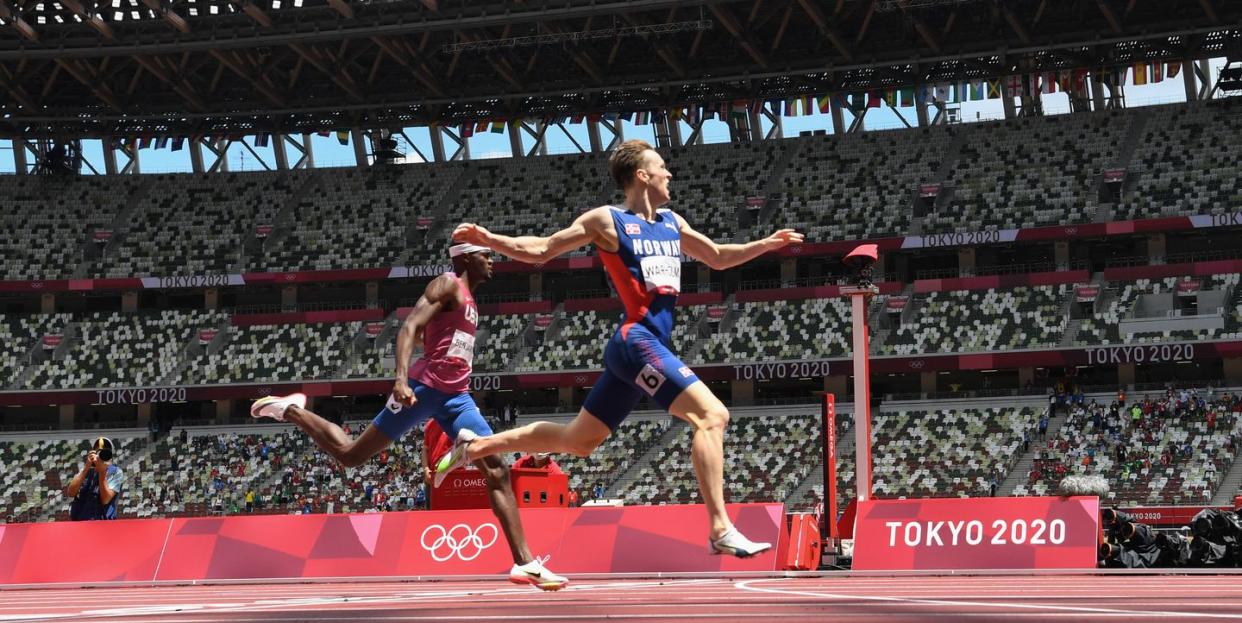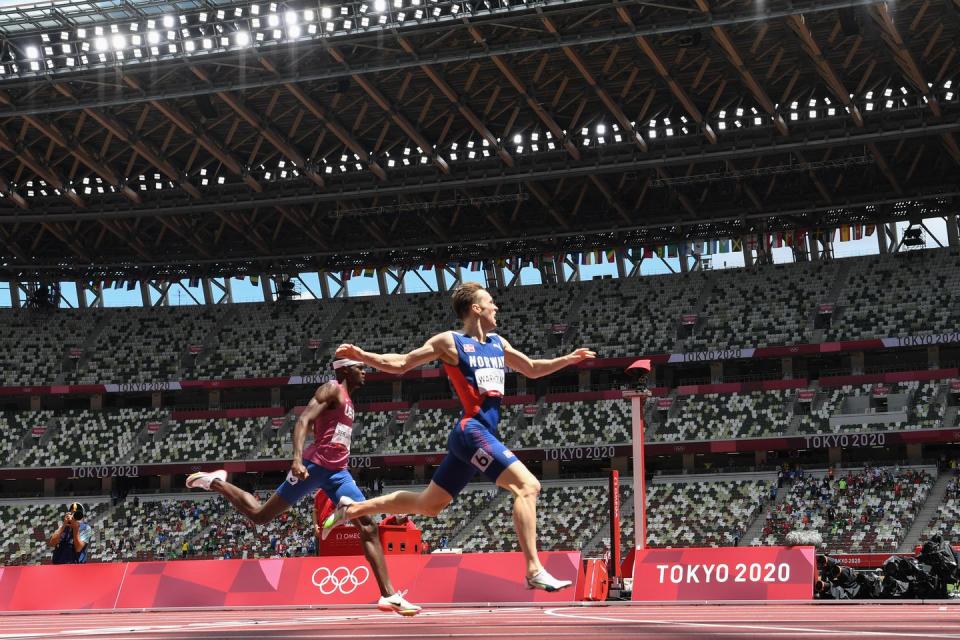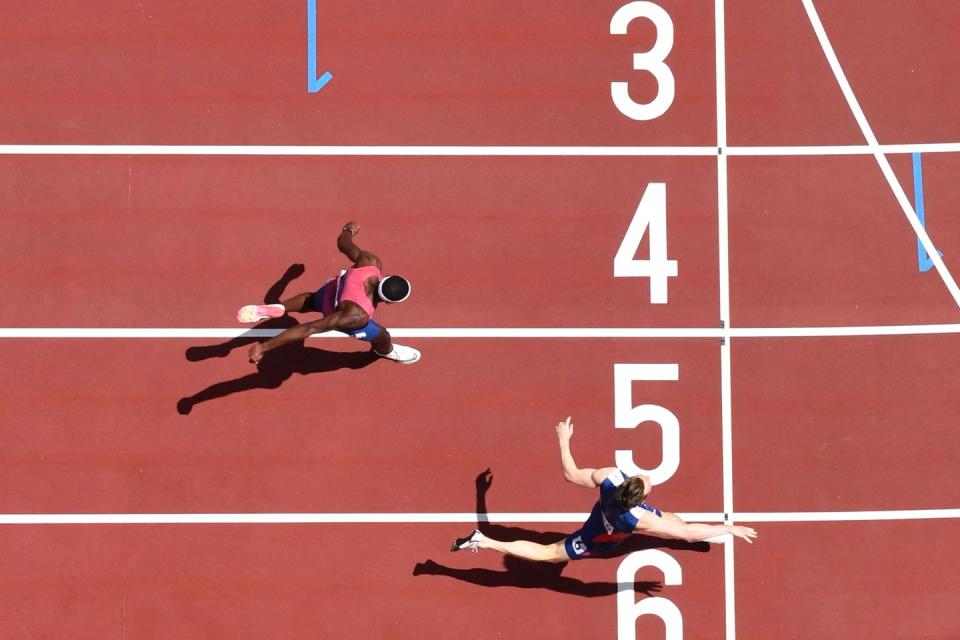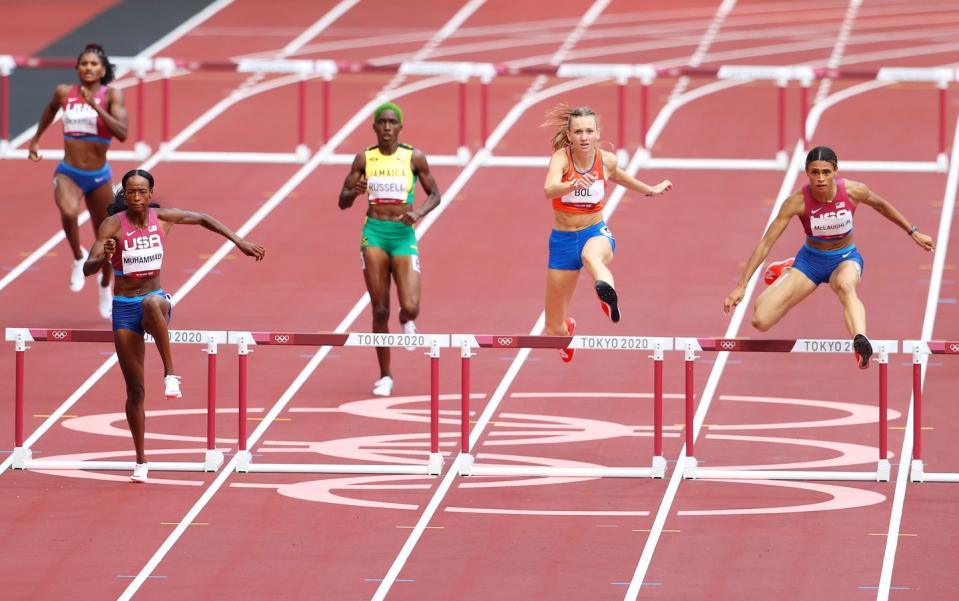Two Epic Races in 24 Hours Made the 400-Meter Hurdles the Most Exciting Race in Track and Field

- Oops!Something went wrong.Please try again later.
- Oops!Something went wrong.Please try again later.

Two races, two world records, and one very special generation of athletes: Across an astonishing 24-hour period in Tokyo this week, the world got to witness two of the finest track finals in Olympic history.
Typically, the 400-meter hurdles is not a marquee event of the Games. But this year, things were different. Not only did these races produce astonishing, mind-bending times by once-in-a-generation athletes, but they were also close, epic contests from gun to tape, with the fate of the gold medal still up in the air as the athletes soared over the last of the 10 hurdles. These races will no doubt be spoken about for generations to come.
Coming into the Games, many had picked them out as can’t-miss races, elevating a cluster of athletes with the class, caliber, and charisma to create the track equivalent of Frazier-Ali. On the men’s side, there was Norway’s Karsten Warholm and the United States’s Rai Benjamin, with everyone thinking Warholm’s world record of 46.70 was under significant threat. In the women’s race, there was the reigning world and Olympic champion Dalilah Muhammad against U.S. teammate Sydney McLaughlin and Dutch star Femke Bol, all three looking poised to attack McLaughlin’s world record of 51.90 that she set a little more than a month ago at the U.S. Olympic Track and Field Trials.
When the hype is as big as this, so often the event itself is a letdown. Not this time—the races didn’t just deliver, they also wildly surpassed expectations. The world records were not just broken, but utterly obliterated.
We’ve seen this before in Olympic finals, and all those present in Beijing for Usain Bolt’s 9.69-second 100 meters at the 2008 Games or in London for David Rudisha’s 1:40.91 800-meter win at the 2012 Games have similar stories to tell.
But the 400-meter hurdles races in Tokyo are in a class of their own.

Warholm vs. Benjamin: The first nail-biter
Let’s start with that men’s race, which went to the line Tuesday morning in Tokyo at the Olympic Stadium—a splendid 68,000-seater cauldron that was mostly empty because of COVID-19 restrictions. There were several hundred journalists present along with a few hundred athletes and coaches, but none of them—not one—would have predicted what happened next.
Warholm was the favorite, but everyone knew Benjamin could beat him—so when the gun fired, the Norwegian exploded from the blocks and ripped through the first half faster than anyone in history.
“I was really trying to stress them,” Warholm, 25, said. “I think I succeeded.”
The only issue: He also stressed himself, passing 300 meters in a mind-boggling 33.2 seconds. Could he hold on?
“I knew I had a crazy American trying to catch me,” he said. “So I ran for my life. I would die for that gold medal. ”
Benjamin was prepared for Warholm’s all-out attack, and one lane inside him, he steadily reeled in the Norwegian as they turned for home. Approaching the last hurdle, he emptied the tank trying to draw alongside Warholm, but his rival met it smoother, charging away to gold in 45.94 and taking a massive 0.76 off his world record.
Benjamin finished second in 46.17, his time also smashing the previous record, while Brazil’s Alison Dos Santos clocked 46.72 in third, quicker than the previous world record of Kevin Young that stood for 29 years before Warholm clocked 46.70 in June.
What did the champion think when he saw the clock, right before a celebration you won’t soon forget where he ripped open his Norway jersey top like he was Clark Kent turning into Superman on the spot?
“This is sick,” Warholm said. “I would say this is the best race ever in Olympic history. I don’t think anything can compare to it. It was insane.”
WORLD RECORD‼️
Norway's Karsten Warholm breaks his OWN world record to win gold in the men's 400m hurdles and @TeamUSA's Rai Benjamin wins the silver. #TokyoOlympics
📺 NBC
💻 https://t.co/ZOFdXC4e4u
📱 NBC Sports App pic.twitter.com/lPSNrv2Qoo— #TokyoOlympics (@NBCOlympics) August 3, 2021
How did Benjamin feel about producing one of the best performances of all time, and still not winning?
“If you would have told me that I was going to run 46.1 and lose, I would probably beat you up and tell you to get out of my room,” he said. “But I’m happy to be a part of history.”
McLaughlin vs. Muhammad: Iron sharpens iron
As all this played out, the women’s finalists were back in the Olympic village, biding their time, aware of what magic could be in store within a day’s span of time.
“I almost couldn’t watch [the men’s final] thinking about what might happen in our race, it was becoming overwhelming,” Muhammad said. “But I did watch. I couldn’t help myself. I knew [then] it would be a fast race, I’m anticipating something crazy.”
What unfolded in the women’s final was indeed something crazy.

Muhammad went into it with the same tactic Warholm employed: To fly through the first half and try put her biggest rivals under maximum pressure. Ahead of the race her coach told her she could run 51.70, well under McLaughlin’s world record of 51.90.
“I was like, ‘Is that fast enough?’” she recalled saying in response.
Muhammad ripped through halfway at lightning speed and was ahead by two meters as the field turned for home. But as she ran to the 10th hurdle, two figures drew alongside her to the left: the orange vest of Bol and the red of McLaughlin.
The track world finally had the showdown it was awaiting: Three of the best to ever do it.
Muhammad met the last barrier a little awkwardly; McLaughlin snapped over it smoother, and as they charged through the final 40 meters, it was the younger of the two—21-year-old McLaughlin—who had more in the tank. She crossed the line first in 51.46, a new world record.
Muhammad got second in 51.58, also well under the old record, with Bol third in 52.03.
“When I saw the time I was amazed, but not surprised,” Muhammad said. “This track is definitely different.”
Two years ago, at the IAAF World Championships in Doha, Qatar, McLaughlin had been in this same scenario, but couldn’t get past Muhammad, beaten by seven hundredths of a second as her rival set the world record of 52.16.
After that race, McLaughlin sat at the bottom of the steps entering the mixed zone—tears in her eyes, sadness in her expression. She had messed up the eighth hurdle.
“The idea of knowing there was more in me is what hurt,” she said today. “I learned from that, I broke down my race, took those fears of whatever was stopping me at that eighth hurdle and got rid of it.”
In June last year she switched coaches to Bobby Kersee, the guru who guided the career of Allyson Felix, among many other greats. “Bobby’s numbers don’t lie,” McLaughlin said. “When he says that you can do something, you can do it.”
Felix gave her simple advice coming to Tokyo.
“Don’t change what got you here,” McLaughlin recalled her saying. ”I made that mistake in 2016 of letting the atmosphere get to me, but this time I just stayed in my bubble.”
HER GOLDEN MOMENT!@GoSydGo takes the gold in world record fashion in the women's 400m hurdles final! #TokyoOlympics x @TeamUSA
📺: NBC
💻: https://t.co/xHOJq5UwlD
📱: NBC Sports App pic.twitter.com/xFGFzaW6Gu— #TokyoOlympics (@NBCOlympics) August 4, 2021
She stayed off social media recently to avoid unnecessary pressure, and in training she and Kersee spent considerable time rehearsing her last 40 meters, making sure she stayed composed, efficient. She did just that in the final, overtaking Muhammad to win gold in 51.46, a world record by almost half a second.
How did this happen?
The new Mondo surface at the Olympic stadium has been a hot topic in recent days, with the designer estimating it’s 1-2 percent faster than previous versions, made possible through “hexagonal design that creates small pockets of air” in its 14-millimeter-thick composition.
“It’s a very fast track,” Warholm said. “But I think it's not just the track—it was the guys as well.”
A point that was also true for the women’s race. Despite clear advances in technology, it was notable that many other events did not produce astonishing times here. The key ingredient remains the athletes’ ability.
McLaughlin knows she would likely not have run so fast if Muhammad wasn’t alongside her, even if she played down the idea of a rivalry.
“There’s no bad blood,” she said. “That’s really just iron sharpening iron.”
It was something Benjamin and Warholm alluded to as well. These were two races, among a generation of all-time greats, that will live forever in the memories of those lucky enough to watch them.
It was a 24-hour spell that will go down in sporting history, one best summed up by Benjamin.
“It’s insane,” he said. “All of us came out and tore it to pieces. Now we’re in a different stratosphere.”
📹 Watch: How Sydney McLaughlin Won at the Trials
You Might Also Like

